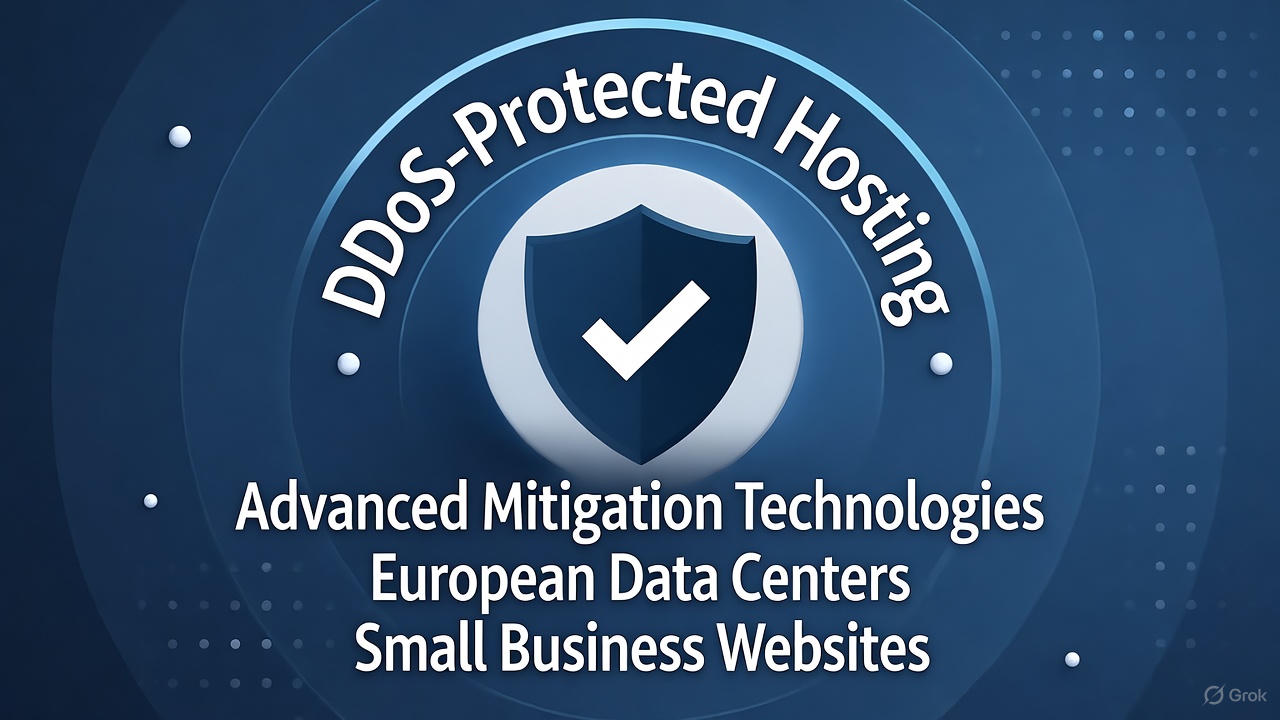
DDoS-Protected Hosting for Small Businesses in Europe
In an era where cyber threats are escalating, small businesses in Europe face unprecedented risks from Distributed Denial of Service (DDoS) attacks. According to the Link11 European Cyber Report 2025, DDoS incidents surged by 225% in the first half of the year alone, with a staggering 438 terabytes of attack volume recorded—equivalent to over seven years of Netflix 4K streaming. For small enterprises, which often lack the resources of larger corporations, these attacks can lead to devastating downtime, financial losses, and reputational damage. DDoS-protected hosting emerges as a vital shield, offering robust defense without breaking the bank. This article delves into the benefits of DDoS-protected hosting tailored for small businesses across Europe, empowering you to safeguard your online presence while focusing on growth.
What is DDoS-Protected Hosting?
DDoS-protected hosting integrates advanced mitigation technologies into standard web hosting services, such as VPS or dedicated servers. It employs real-time traffic filtering, scrubbing centers, and AI-driven detection to identify and block malicious floods of requests that aim to overwhelm your server. Providers like Cloudflare and OVHcloud operate geo-distributed networks across Europe, ensuring low-latency protection compliant with EU regulations like NIS2 and DORA. Unlike basic firewalls, this hosting proactively absorbs attacks at the network edge, allowing legitimate traffic to flow uninterrupted—ideal for Europe’s diverse small business landscape, from e-commerce shops in Berlin to startups in Lisbon.
Key Benefits of DDoS-Protected Hosting for Small Businesses in Europe
1. Minimized Downtime and Revenue Protection
A single DDoS attack can cost small businesses €8,000 to €74,000 per hour in lost sales and productivity. Protected hosting ensures 99.99% uptime by filtering threats before they hit your server, keeping your site accessible during peak hours. For European retailers during Black Friday or local holidays, this translates to preserved customer access and steady revenue streams.
2. Cost-Effective Security Without In-House Expertise
Small businesses often can’t afford dedicated IT security teams. DDoS-protected hosting offloads this burden to the provider, with automated mitigation starting at €20/month—far cheaper than recovery costs averaging €52,000 per incident. Providers like FastComet offer inclusive plans with no hidden fees, making enterprise-grade defense accessible for SMEs in countries like the UK or France.
3. Enhanced Compliance with EU Regulations
Europe’s stringent data protection laws, including GDPR and the upcoming NIS2 Directive, mandate robust cybersecurity. DDoS-protected hosting helps small businesses meet these standards by providing audit-ready logs, real-time alerts, and continuous testing. This not only avoids fines up to 4% of global turnover but also builds trust with EU customers who prioritize secure online experiences.
4. Improved Website Performance and User Experience
Beyond defense, these solutions use content delivery networks (CDNs) and optimized servers to boost load times by up to 50%, enhancing SEO and conversion rates. For small European tourism sites or local service providers, faster, reliable access means higher engagement from mobile users across the continent.
5. Scalable Protection for Growing Businesses
As your small business expands—perhaps from a solo operation in Amsterdam to a multi-location venture—DDoS-protected hosting scales seamlessly. Entry-level plans handle 10 Gbps threats, while upgrades support Tbps-scale attacks, all without downtime. This flexibility supports seasonal spikes, like holiday traffic for Italian artisan e-shops.
6. Reputation Safeguard and Customer Trust
Downtime erodes credibility; 75% of consumers avoid brands after a negative online experience. By staying online during attacks, protected hosting preserves your brand’s reliability. In competitive European markets, this fosters loyalty, especially among privacy-conscious users in Germany or Scandinavia.
7. Real-Time Monitoring and Rapid Response
Advanced analytics provide 24/7 dashboards tracking threats, with mitigation in under three seconds. For small teams, this means proactive alerts via email or app, allowing quick adjustments without expert intervention—crucial for time-zone-spanning operations in Eastern and Western Europe.
8. Protection Against Evolving Threats
Hacktivist groups like NoName057(16) targeted European banks and governments in 2025, with DDoS comprising 77% of incidents per ENISA’s report. Modern hosting counters Layer 7 attacks mimicking legit traffic, using AI to adapt—vital as attacks grew 358% in Q1 2025.
9. Eco-Friendly and Localized European Data Centers
Many providers, like OVHcloud in France, use energy-efficient European data centers, aligning with the EU’s Green Deal while reducing latency for regional users. This supports small businesses in remote areas, like rural Spain, with sovereign data handling.
10. Competitive Edge in a Threat-Heavy Landscape
With DDoS-as-a-Service making attacks cheap (€5/hour for attackers), small businesses gain a strategic advantage. Protected hosting levels the playing field against larger rivals, enabling innovation without fear—key for Europe’s vibrant startup ecosystem.
Why DDoS-Protected Hosting Matters for Small Businesses in Europe
Europe’s digital economy is booming, but so are threats: ENISA reported 4,875 incidents from mid-2024 to mid-2025, with DDoS dominating. Small businesses, comprising 99% of EU enterprises, are prime targets due to weaker defenses. In nations like Poland or Ireland, where e-commerce grew 15% in 2025, unprotected sites risk collapse. DDoS-protected hosting isn’t a luxury—it’s essential for resilience amid geopolitical tensions and rising cybercrime.
How to Choose a DDoS-Protected Hosting Provider in Europe
Selecting the right provider is straightforward:
- Mitigation Capacity: Aim for 10–100 Gbps for small-scale needs; check for Tbps scalability.
- European Presence: Providers with PoPs in Frankfurt, Amsterdam, or London (e.g., Cloudflare, Imperva) ensure low latency.
- Pricing and SLAs: Look for affordable plans (€10–50/month) with 99.9% uptime guarantees and refunds for failures.
- Ease of Use: Free migrations, cPanel integration, and 24/7 EU-based support are must-haves.
- Certifications: Verify GDPR compliance and partnerships with bodies like The Green Web Foundation for added trust.
Top picks for 2025 include Cloudflare (free tier for basics), OVHcloud (unlimited protection), and FastComet (SME-focused).
